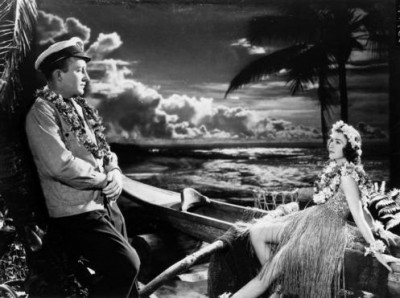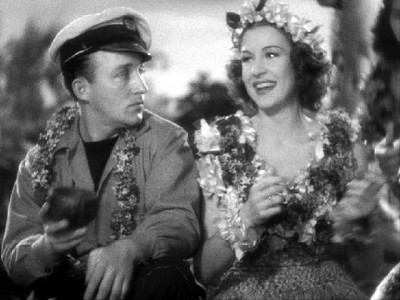
It is wholly accidental that the Asheville Film Society programmed a second film by Frank Tuttle this month. His Waikiki Wedding (1937) was chosen simply because it’s one of Bing Crosby’s few truly good 1930s films (Crosby hit his movie stride more in the 1940s), and (like most Frank Tuttle movies) it’s not as well known as it ought to be. The film is almost a throwback to earlier 1930s musicals—several scenes feel almost like Lubitsch’s work—and is altogether a slender delight conjured up by Paramount Pictures second-unit Hawaiian location work and rear-screen projection. In other words, the furthest the cast actually got from the Melrose Avenue studio was some location shooting at the Los Angeles County Arboretum. But it’s the sort of slight of hand that Paramount was so good at that that it hardly matters. It’s sheerest fantasy of the finest Hollywood kind.

Bing plays Tony Marvin, the terminally lazy idea man for the Baldwin Pineapple Company, whose latest scheme of a contest involving a “Pineapple Queen” goes awry when the winner, Georgia Smith (Shirley Ross), doesn’t like Hawaii and wants to go home. Faced with the impending publicity nightmare, his boss (the indispensable George Barbier) compels him to romance the young lady—which he does most elaborately. And, of course, he falls in love with her along the way. It’s all terrific fun in a light and breezy style perfectly suited to Crosby’s talents. Plus, you get six new songs by Ralph Rainger and Leo Robin—including the standards “Blue Hawaii” and “Sweet Leilani”—some typically attractive “exotic” dance numbers (courtesy of choreographer LeRoy Prinz), and some solid comedy.

The inclusion of Marha Raye and Bob Burns as a subordinate comic couple is either a plus or a minus, depending on how you feel about Raye and Burns, but the inclusion of a pet pig (named Walford) for Burns is definitely a plus. (And, there’s some simian value, too, since Paramount had strange notions of animal habitats.) Also, there’s Shirley Ross, who never had the career she should have, as Bing’s love interest. Miss Ross started out (preposterously enough) in light blackface as a singer at the Cotton Club in Manhattan Melodrama (1934), where she introduced a song called “The Bad in Every Man” (that only became famous later, with new words, as “Blue Moon”). She had some good roles after that, including this one and another introducing “Thanks for the Memory” with Bob Hope in The Big Broadcast of 1938. But for whatever reason, she never quite caught on.
The Asheville Film Society will screen Waikiki Wedding Tuesday, Nov. 19, at 8 p.m. in Theater Six at The Carolina Asheville and will be hosted by Xpress movie critics Ken Hanke and Justin Souther.




Before you comment
The comments section is here to provide a platform for civil dialogue on the issues we face together as a local community. Xpress is committed to offering this platform for all voices, but when the tone of the discussion gets nasty or strays off topic, we believe many people choose not to participate. Xpress editors are determined to moderate comments to ensure a constructive interchange is maintained. All comments judged not to be in keeping with the spirit of civil discourse will be removed and repeat violators will be banned. See here for our terms of service. Thank you for being part of this effort to promote respectful discussion.